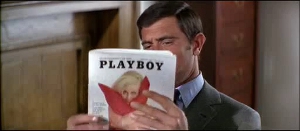
Like I said,
To this day I wish Connery had stuck around for one last swan song. Bond fans could’ve avoided a whole lot of heartache…
But then again, maybe not. I like Connery, but not the bored, sick-of-it-all self-parody he became by the time he filmed You Only Live Twice. So I might as well confess: I’m one of those people who actually like On Her Majesty’s Secret Service. I won’t dare call it “the best Bond film ev-ahr” when we’ve still got sixteen of these damned things to go…but I will stick my neck out far enough to call it the best film since Goldfinger. Halfway through, I guessed they had to work through two films worth of same-y-feeling crap before anything good escaped the pipeline.
Turns out that’s truer than I’d like it to be. OHMSS (as it’s reverently known) was originally meant to follow Goldfinger. Returning series screenwriter Richard Maibaum stated pecking out the script, an adaption of Fleming’s tenth Bond novel, while the film rights to Thunderball were still up in the judicial air. After Thunderball hit, the warm Swiss summer of 1966 made most of OHMSS’ Big Ticket action sequences prohibitively expensive (if not outright life-threatening). Production relocated to Japan and re-purposed everything for You Only Live Twice. When that did even better than Thunderball, OHMSS finally saw daylight…after a two-year search for the Next James Bond.
Connery’s quitting destroyed any chance of this film being judged by its own merits, in its own time or ours. Its star, George Lazenby, became the butt of jokes from the moment someone discovered his origins as a model and “face” of several candy bars ads. Like the one that starts around the 2:50 mark in the following (Lazenby’s the one with the Big Box of Turkish Delight, full of Eastern Promise):
Series producers Broccoli and Saltzman were going to give the role to a then-twenty-two-year-old named Timothy Dalton…but Dalton turned them down for the it-sounds-insane-today reason that he felt he wasn’t old enough to play Bond. TV’s own Saint, Roger Moore, became a natural second choice…until another season of The Saint consumed his full attention. After all that, no matter who Danjaq chose to play The Second Bond, that person stood to inherit the unfair perception of being everyone’s Third Choice. It’s just our bad luck they picked George, and George’s bad luck they picked him for this.
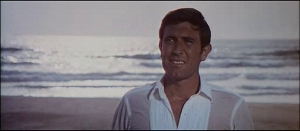
There’s a weird skittishness about OHMSS, as if it were trying to pull away from the Formula this series had just set in stone even as they assured fans of continuity. Everyone behind the camera was all too aware of how skittish movie audiences could be. Change frightens people, and with all the ambient changes bounding around the late-60s people were scared enough already. Hell, people are still scared of the 60s. A changed Bond was, possibly, one more piece of fuel for the cultural fires that were, even as this movie premiered, starting to burn themselves out all over the world.
So after teasing us by shading the Second Bond’s new face, we get an excellent opening sequence. Bond’s out for a drive when he notices a woman walking into the surf, apparently trying to drown herself. Rescuing her, he finds himself set upon by thugs. She flee while Bond teaches the thugs a lesson about manners, leaving a shoe in the sand. Our Second Bond turns to the camera and, for some, ruins this perfect moment with That Infamous Line.
This never happened to the other fellow.
Not an infamous line…not even the infamous line (there are plenty of both in this series) but that one: the line that’s caused more arguments than anything in this franchise…besides the casting of Daniel Craig. That line opens up a far larger can of worms than anyone – from Cubby to Saltzman to Richard Maibaum to director Peter Hunt to ol’ George – could’ve possibly imagined on set. It’s a pointless in-joke, with no baring on anything apart from the action scene it (in screenwriting terms) “buttons up.” Yet this has been interpreted as everything from a Brechtian violation of the fourth wall to an acknowledgement that this different-looking-but-still-fundamentally-the-same “James Bond” is actually a different person entirely.
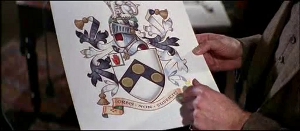
Both these theories are bullshit, especially the last. The film goes out of its way to assure each and every little lamb that, yes, this is the same Bond you saw the last five times. He has the same exchange with Moneypenny (still Lois Maxwell) that he always has: “You’re late.” “Well, you’re hot.” “Oh, shut up and get in there – this time he’s really mad at you.” If not for a nesessary plot permutation, he’d have the same scene with M (still Bernard Lee). A little later, we’ll watch Bond clean out his desk and find it packed with debris from his past adventures: Honey Rider’s knife, Robert Shaw Grant’s garrote-watch, the Secret Stash of Emergency Booze we haven’t seen him dip into since Dr. No. A little later, in a pace-killing distraction that makes the second half hour of this film draaaaaaagggggg ass like a dog with a turd stuck to its fur, Bond shags his way through an entire “allergy research” institute’s worth of international hot chicks…despite having apparently fallen in love.
As for the Fourth Wall…do you really think anyone at Eon cared about Brechtian Distancing? Our director might have, but the rest of ’em…? Either way, the “other fellow” Bond’s referring to is that old empty suit most people call “Prince Charming.” From Cinderella…? What, was the one shoe not enough? Does it have to be made of glass before the metaphor sinks in? I guess so…
Our suicidal Cinderella, in this case, is the Contessa Teresa di Vicenzo (TV’s Diana Rigg, fresh from her two years on The Avengers)…who prefers “Tracy” because “Teresa was a saint” with significantly fewer goons following her around. Switching up the Thunderball paradigm, rather than meeting his Villain over a card game, Bond meets his Girl and gets her out of the gambling debt she (it’s implied) intentionally gave herself. The next day, in another refreshing change of pace, she’s the one who leaves him in bed, with no one but the goon squad for company.

Turns out these are the family bodyguard squad of Tracy’s father, Marc-Ange Draco (Gabriele Frezetti), head of the second-largest crime syndicate in Europe (after SPECTRE, of course). Concerned with his daughter’s self-destructive behavior – which, despite being life-long, only crossed into suicidal territory after her husband wrapped his Mazzerati around a tree, along with himself and “one of his mistresses” – Draco offers Bond a one million pound bribe dowry to marry her, along with some good ol’ fashioned Corsican sexism…I mean, “relationship advice”
“She needs a man! To DOMINATE HER! To make love to her enough to make her love him!”
Yeah, because that’s how it works. With such a encouraging, supportive father figure around, I can’t imagine how Tracy wound up contemplating suicide. I admire Draco’s commitment, and his actor’s boisterousness, which helps sell his dubbed lines. Anybody can call themselves a “Pimp” or a “Mac Daddy” but at least Draco runs with it. And at least Bond (the walking international STD culture) has the moral fortitude to respond with the equivalent of “That’s pretty fucked-up, buddy, even for me.” Or, more to the point
“I find [Tracy] fascinating but she needs a psychiatrist, not me.”
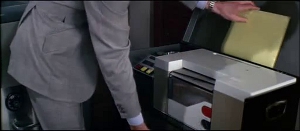
No shit, but there are no shrinks to be had in Bond’s universe, and everything leads back to some asshole’s plot to blackmail the world.
In this case, it’s once again Blofeld (now played by Telly Savalas), who’s gone underground for so long, M calls Bond back to London just to tell him, “You’re off the case.” Bond responds with a resignation letter he makes Moneypenny type, allowing her to change the wording, making it a two-week leave of absence instead. Nice to see her actually do something in these movies, other than stand-in for all the repressed housewives in the audience. Those two weeks give Bond enough time to meet the Dracos in Portugal. Ringside at the bullfights, Tracy blackmails her father into telling Bond where Blofeld might be hiding.
Since the Unione Corse has resources MI6 doesn’t, Draco’s found Blofeld’s lawyer in Switzerland, doing due diligence on Blofeld’s claim to the title “Comte Balthazar de Bleuchamp.” Which, Bond informs M (and thus us) is “the French form of Blofeld.” It’s also a neat way to avoid saying the name more often than absolutely necessary, since the rights to Blofeld-the-character (and everything else Thunderball-the-novel created) were trapped in a legal Purgatory I did my best to explain in my review of Never Say Never Again. Either way, Blofeld’s asked the College of Arms in London to verify his claim, allowing Bond to go undercover as a College genealogist and infiltrate Blofeld’s Alpine mountaintop “institute for allergy research”.
Apart from having fewer scars than Donald Pleasence, Sevalas also brings more personality to the role. I think that’s a factor of him having more to do than Dr. Loomis and having another actor to work with who isn’t visibly disgusted with his life choices. The script’s better too, now that series writer Richard Maibaum’s back in the saddle…but that does not make Blofeld’s ultimate plan any less silly, or this film any more “realistic” than its predecessors. Just better.
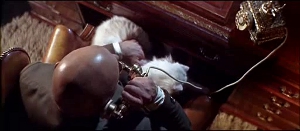
That word “realistic” has lost most of its clout with me after years of hearing people use it to describe things like Chris Nolan’s Batman films (i.e. incorrectly). With Blofeld’s breeding a super-special-awesome Omega bacteria that’ll sterilize the world’s food supply down in the basement of his “institute,” and post-hypnotically training a small army of international rich women to distribute it, how is this any more “realistic” than the movie with the Space Capsule Snatcher? Or the movie with the (attempted) dirty-bombing of Ft. Knox? It even fits with SPECTRE’s charter. The hypnotized debutantes are Blofeld’s new Counterintelligence army. His idea of Terrorism’s moved from nuclear to biological. The Revenge is obvious, while the plan to Extort pardons for all his past crimes out of the UN (as opposed to uncut diamonds or cold hard cash) is the closest thing to a “realistic” element around this scheme.
So Sevalas gets more to play all around, and because of that he may be my favorite Blofeld of the whole series. For starters, he gets more than one scene with Bond, and for enders he doesn’t have to share the spotlight with some local SPECTRE point man, like Largo or Mr. Osato. We see Blofeld in the fullness of his criminal empire, with a main henchperson who’s both (a) threatening and (b) not a blond giant. Instead, Irma Brunt (Ilse Steppat) is like an evil Cloris Leachman. And if that doesn’t scare you, she’s backed up by Blofeld’s army of machine gun packing ski-henchmen, all too willing to go to their deaths.
But Blofeld’s best scene comes when he tries to be suave and convince Tracy (whom he’s captured, this being the film’s last act) to throw in with him. If his scenes with Lazenby are examples of Telly putting on an Acting Clinic (“sit down, son, fold your kilt, and watch how this works”), watching him with Rigg is like watching the Final Round of an Act-Off Competition…His second best scene comes during the mid-movie ski-chase, when he orders three henchmen to go on chasing Bond while he triggers an avalanche. Classic supervillainy.
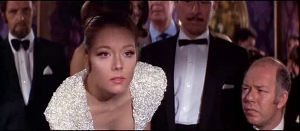
And let’s talk about Dame Rigg, my favorite Bond Girl of the series. Having survived two years as Emma Peel she came to this franchise with more raw acting talent than an army of international pageant winners. Combined with the fact she’s playing a character with a backstory (beyond the usual “also a superspy” or “on a quest to kill the bad guy”) and a life outside of the main plot, this puts her head and shoulders above her predecessors. The revelation that James Bond – bachelorhood incarnate – could possibly pop the question to anyone and mean it shocked fans during the film’s first run. The fact that it works shocks me to this day, but it does, every time. Tracy’s exactly the kind of damaged person Bond goes weak-kneed for in the first place, but her Original (very Original) Gangster’s attitude towards life, love of reckless driving, and ability to ski-jump off cabin roofs elevates her to Bond’s aesthetic level. If I were an adrenaline junky superspy, this is exactly who I’d want to come home to…
No, scratch that. I’d take her with me and parade her around in front of God and everybody. I’d go Paul W. S. Anderson on that shit. “Hey, guys, check out my incredibly hot wife! Forget all the others, this girl can drive. She turns stock car races into demolition derbys! And quotes James Elroy Flecker!” I’d want to spend all my time with her…which is why it sucks that this movie compresses their initial love affair into a montage. (Yes, even On Her Majesty’s Secret Service had a montage.) Set to the last thing Lois Armstrong recorded before he died, Hal David’s “We Have All the Time in the World.” Knowing when it was recorded just makes it sound creepier, doesn’t it?
Know what else? This movie’s not perfect – it’s just on par with the series best precisely because it gives Bond the things he’s lacked all this time – a character arc.

Yeah, I said it – up to this point, the character of James Bond has been two-dimensional at best, with both of those supplied by his actor. Being the first post-movie deal novel Fleming wrote (they were shooting Dr. No just a little ways down the beach at the time), OHMSS contains the most characterization Bond ever received. Part of that flows from all the annoying questions the filmmakers brought to Fleming – unimportant claptrap about Bond’s background and motivations, whatever that meant. (As if Queen and Country weren’t motivation enough!) So here we learn of Bond’s Scottish heritage (thanks to Fleming’s then-budding friendship with Connery) and his capacity for authentic human emotion – like love, yes…but also regret. In the novel he visited the grave of Vesper Lynd, whom we won’t meet on screen for decades yet. In the film, he faces Death and blinks just as much as we all would if we found ourselves in a similar situation. Then-Village Voice critic Molly Haskell put it best,
“In a world, an industry, and particularly a genre which values the new and improved product above all, it is nothing short of miraculous to see a movie which dares to go backward, a technological artefact which has nobly deteriorated into a human being.”
Damn right, sister. Testify.
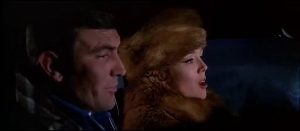
But you know how audiences are. They don’t like to see their Ideas decay…especially not into the weird, pseudo-people who populate most of our movies. And while James Bond the Idea would live on, James Bond the Person (in this film) looks a bit lost and unprepared for the challenges around him. Makes sense if you know a where his actor came from, but I understand how it can be hard to square this broad-faced male model with the cynical bastard we saw in the last five films.
Then again, I never liked that cynical bastard very much in the first place. I found him strangely…disaffecting. Perhaps it’s because he seemed disassociated from everything around him, no matter how outrageous. As if he knew he would survive. As if he’d read ahead in his own life’s script. There’s none of that here because Lazenby greets the extraordinary with a deer-in-the-headlights gaze I can easily project myself into. Is that a failing on his part as an actor? Yes. But I’d argue it’s a success on the film’s part, because for once I actually give a crap about James Bond.
Admittedly that’s not due to Lazenby so much as all the things around him. Peter Hunt’s direction completes the New Wave takeover he began three films ago, when he was still an editor and the action scenes visibly improved. Finding himself in the Big Chair, Hunt (or his padawan) makes some basic continuity mistakes (watch people’s hands – or don’t, if you don’t want your illusions spoiled) but his stunning compositions make up for it. His action scenes honestly thrill while maintaining the scope begun by the end of Thunderball, all without the benefit of a Ken Adam set. The climactic battle between Blofeld’s henchmen and Draco’s army is the best since Goldfinger. And that ending…damn…just damn.
So don’t believe the hype. On Her Majesty’s Secret Service is a fine film in its own right and the first good Bond film in five years. Shame about Lazenby, though. Apparently, his agent managed to convince him that the Spy-Fi Films would soon die out in the “liberated” 1970s. What do you expect? It was 1969. People still held on to a little hope. So, of course, Sir Sean of Connery had to return. Hopes aren’t about to crush themselves.
![]()
![]()
![]()
![]()
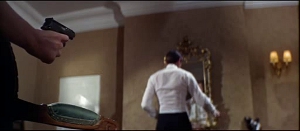

Yeah, myself and a fellow Bond fan both agree this film is highly underrated, for all of the reasons you mention. Right up there with Goldfinger, the Spy Who Loved Me, Goldeneye and, (heresy perhaps) the best of all, Casino Royale.
And on the subject of overrated Bond films…
I know should have said this a while ago but Fleming is spelled with one “m”. There, I said it.
As for the drag in the middle, I know how you feel but I feel it was because of the absurd lengths of “disguising” Bond. Dubbing Lazenby over with the voice the real Bray and making him into a comical fop was annoying because it feels like George left for most of the film after he proved to be a good leading man. Regardless, I did enjoy his antics at the clinic by seducing the girls by reusing the same pick up lines; Kills me every time.
“Perhaps it’s because he seemed disassociated from everything around him, no matter how outrageous.”
Que ? Bond did not seem “disassociated” with anything happening in Doctor No or From Russia With Love. Remember what I already told you about Doctor No ? Breaking down the invincible man in the casino ? And in From Russia With Love on his knees at Grant’s mercy ? He had no plan until Grant asked about that other attache case. No, Bond felt very vulnerable in the early films and here in OHMSS when Bond had to mostly improvise to escape Blofeld’s henchmen.
I should’ve probably used the word “unaffected,” and meant it (for once) as a critique of Bond’s actor rather then the character himself. I get that the ability to project unflappable bad-assitude got Connery the role to begin with, and it’s fun to watch…for awhile…at least, the first three times out. But the man lost something on the set of Thunderball…like his ability to give a crap. And if he’s not going to, why should I? That’s what really made Thunderball and You Only Live Twice drag, at least for me. I know people love Connery somethin’ fierce (having been raised by a pair of Connery Fans) but he never really impressed me as an actor until well into the late 1980s. Ol’ George was no great shakes in that department either, but he seemed to use his wide-eyed inexperience with the world of Big Budget Action Movies to inform his character, adding a dose of “I honestly have no idea what the fuck is going on” to the Classical Connery shtick of “This is all crazy. Isn’t all this crazy, you guys…? Is that the Duke of Wellington’s portrait over there…? See what I mean? Crazy…Well, someone’s gotta deal with all this. Queen and country, and all that.”
Woah, I really hope you aren’t dismissing Connery’s performances in Sidney Lumet’s films and the John Huston epic, The Man Who Would be King. IMO, Connery proved himself to be a powerful actor in The Hill.
As for Thunderball, I actually thought Connery’s performance was pretty smooth though lacking the vulnerability and humanity in the previous Terrence Young films.
Did you know that filming the bobsled race between Bond and Blofeld cost the life of a cameraman ? He was dangling from a helicopter in a safety harness, and hit a tree. Also one of the stuntmen involved fell out of the bobsled and was dragged, with his helmet making sparks all the way. He wasn’t killed, so they used that sequence in the movie. I agree that OHMSS is under-rated. Even if Lazanby had been a brilliant actor, which he wasn’t,the fact that he wasn’t Sean Connery kept the critics and the public from giving him a chance. The only other film I ever saw him in was a chop sockey one called The Dragon Flies, set in his native Australia, in which he was the villain and a Hong Kong cop the hero. He wound up dying by having a grenade pushed into his mouth.
The search has officially begun for The Dragon Flies.
I think it also goes by the titles “Stoner” and “The Man From Hong Kong”.
Lazenby was also in a giallo named “Who Saw Her Die”. It’s not bad either.
Consider it added to the list.
I really should make an effort to watch this film all the way through. I love Blofeld’s blackmail idea; holding the world’s food supply hostage via an all-female army of dupes controlled by hypnosis is absolutely brilliant (even if you nab Blofeld, you still have all those unsuspecting women with those bottles of “perfume” to chase down).
I think his demands were just modest. In the novel, it was suspected that this whole virus plot was an biological attack commissioned by the Russians to target England.
Lazenby’s Hong Kong movies are Stoner, The Man From Hong Kong (AKA Dragon Flies) and A Queen’s Ransom
Awesome. Thank you, James.